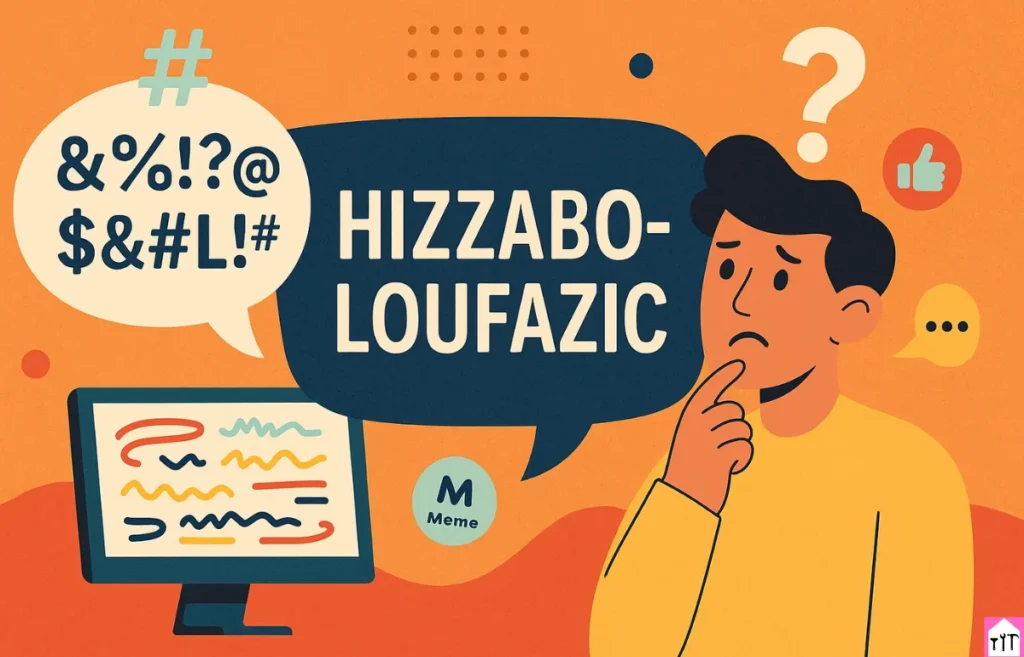
In today’s ever-evolving internet culture, new words are created, shared, and celebrated at lightning speed. Among these quirky linguistic inventions lies a curious term that’s been gaining traction in online communities: hizzaboloufazic.
Though it might look and sound like nonsense, hizzaboloufazic carries a surprising amount of meaning for those who use it. It’s a word born from internet satire, used to mock complexity, highlight absurdity, and signal playful confusion in the face of too much information. While you won’t find it in any dictionary, its presence is felt across meme threads, forums, and social media timelines where linguistic play is part of the culture.
Let’s unpack the origins, meaning, use cases, and significance of hizzaboloufazic — and explore what it tells us about how language evolves online.
How the Term Hizzaboloufazic Was Born
Organic Language Creation in Digital Communities
Unlike traditional words that pass through linguistic history and academic scrutiny, hizzaboloufazic likely started as a spontaneous creation — a mashup of syllables meant to sound funny, foreign, or excessive. There are no official records of its first use, but anecdotal traces link it to meme-centric Discord servers and niche Reddit threads.
In these communities, absurd or fabricated words are often used for humorous exaggeration. Hizzaboloufazic fits perfectly into this mold. Some suggest it was born as a response to corporate buzzwords or overly technical explanations in posts, essentially saying: “This is nonsense — let’s call it hizzaboloufazic.”
This kind of spontaneous naming reflects what linguists call “phonesthetic invention” — creating words that feel emotionally or socially “right” even without a clear meaning.
Defining Hizzaboloufazic: What Does It Really Mean?
Despite its lack of official recognition, users have settled on a handful of shared meanings. Hizzaboloufazic is not a single-word definition. It adapts to context but generally falls within these categories:
| Usage Context | Interpretation |
|---|---|
| Ridiculous or nonsensical | Describes content that defies logic or basic understanding |
| Overly technical or wordy | Mock writing or speech that is unnecessarily complicated |
| Playful or humorous | Injects fun into otherwise serious or dry discussions |
| Community-specific slang | Marks in-group humor or shared understanding within digital subcultures |
These meanings make hizzaboloufazic versatile — useful in tech circles, gaming chats, or any conversation that veers into the absurd.
Why Hizzaboloufazic Resonates: Cultural Relevance in the Internet Age
A Reaction to Information Overload
We live in a world of over-explained content, endless jargon, and algorithmic nonsense. In this climate, a word like hizzaboloufazic is not just funny — it’s a form of protest. It calls out pretentiousness, mocks the complicated, and celebrates the absurd.
This is especially true in contexts like marketing copy, AI-generated text, or academic overanalysis. Instead of engaging in long-winded critique, users can simply dismiss content with, “That’s just hizzaboloufazic.”
Linguistic Humor and Group Identity
In the same way, terms like “yeet,” “sus,” or “cringe” gained popularity; hizzaboloufazic operates as a signifier of cultural fluency. If you know it, you belong. It’s part of what sociolinguist Deborah Tannen describes as rapport talk — using language to build bonds rather than simply transmit information (Tannen, 2006).
Hizzaboloufazic may be nonsense, but it’s the shared nonsense that makes it meaningful.
Related Internet Terms That Echo Hizzaboloufazic
To better understand where this word fits in digital language, here are some closely related terms and their meanings:
| Term | Definition |
|---|---|
| Gobbledygook | Overly technical or bureaucratic language that obscures meaning |
| Technobabble | Scientific or technical-sounding nonsense, often used in sci-fi or marketing |
| Nonsenseposting | Deliberate use of absurd or surreal content for humor or confusion |
| Word Salad | A mix of words that appear complex but are ultimately incoherent |
| Meme Speak | Evolving slang derived from internet humor and inside jokes |
All these reflect the same cultural impulse: to name and reject overly complex or absurd communication.
How to Use Hizzaboloufazic Correctly (and Responsibly)
While there are no hard rules for using an invented term, the online consensus tends to follow these informal guidelines:
Appropriate Uses:
As a humorous label for confusing information
When playfully critiquing jargon-heavy content
In memes, comments, or tweets to signal shared confusion
To create a sense of in-group humor in chats or communities
When Not to Use It:
In formal writing or presentations
When mocking someone directly (avoid being personal)
In professional or legal contexts where clarity matters
With audiences unfamiliar with internet slang
Ultimately, context is king. Hizzaboloufazic is most effective when your audience understands that it’s meant as a joke, not a judgment.
Real-World Examples of Hizzaboloufazic in Action
In Tech Circles
“I tried reading the terms and conditions. It’s just 30 pages of hizzaboloufazic.”On Reddit
“This theory about aliens building the pyramids? Total hizzaboloufazic, bro.”On Twitter/X
“When ChatGPT gives you a five-paragraph answer to a yes-or-no question: hizzaboloufazic mode activated.”In Academia Memes
“Abstract: This paper examines socio-ecological paradigms in urban entropy dynamics… aka pure hizzaboloufazic.”
Expert Insight: The Value of Play in Language
Gretchen McCulloch, in her book Because Internet, argues that online speech evolves faster than spoken language due to constant remixing, audience feedback, and creativity. Hizzaboloufazic is a textbook case of what she calls “linguistic innovation for amusement” (McCulloch, 2019).
It might not “mean” anything, but its function in conversation, bonding, and satire is unmistakable.
Frequently Asked Questions
What is hizzaboloufazic?
Hizzaboloufazic is an informal, invented word used mostly in online communities to describe something confusing, ridiculous, or overly complicated. It’s often used with humor or sarcasm.
Is hizzaboloufazic a real word?
Not in the dictionary sense. It’s a neologism — a new, playful word created and shared by internet users, not by formal institutions.
Can I use hizzaboloufazic in professional settings?
No. It’s best used in casual, internet-savvy contexts. In emails, reports, or formal settings, it could confuse or alienate your audience.
Where did the word hizzaboloufazic originate?
There is no definitive source. It likely began as a joke or meme in digital subcultures like Discord, Reddit, or Tumblr.
What does it say about online culture?
It reflects how modern internet users push back against complexity and find community through shared language, even nonsense language.
Conclusion: Why Words Like Hizzaboloufazic Matter
Hizzaboloufazic might seem like a throwaway term — just internet noise. But it reveals something deeper: how language adapts to new environments, how people cope with digital overload, and how humor can be a powerful unifier.
In a world flooded with data, sales pitches, and half-baked theories, sometimes you don’t need to argue — you just need to laugh and say, “That’s hizzaboloufazic.”
Next step? Start listening. Watch how your communities use words creatively. And maybe try dropping it into your next group chat — just to see who’s in on the joke.
